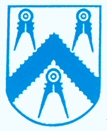Goat and Compasses
Q From Dana Fossum in Norway: I’ve read that the British pub sign The Goat and Compasses is actually a corruption of the phrase And God Encompasses Us All. Is there actual evidence for the supposed older name? I’m not sure just where, unfortunately, but somewhere not too long ago I’m pretty sure that I ran across an article claiming that this popular story is in fact not true and that Goat and Compasses is not a corruption.
A The story that the pub sign is a corruption isn’t new — I’ve encountered it stated as fact that it comes from “God encompass us” in what felt like volume 93 of Thomas Carlyle’s monumental work, The History of Friedrich II of Prussia, published in 1865.
Modern authorities are extremely sceptical about this origin, to say the least, as there seems to be no evidence of public houses ever having had the uncorrupted form of the name (it does seem unlikely as a name for a pub, as you may agree). There are several famous examples of pub names being corrupted forms — Bacchanal, for example, turned into Bag o’ Nails and George Canning became the George and Cannon — but this seems not to be one of them.
Nobody can say what its origin is. The compasses were a common symbol of the exact sciences, frequently found in the emblems of trade guilds and also in the symbology of the Masons. So the sign may indeed be a combination of a goat and compasses, perhaps having a guild association that is now lost. It has been suggested in particular that it’s derived from the arms of the Wine Coopers’ Company of Cologne, or from the arms of the Carpenters’ Company.

It is often said in Web pages that the latter’s arms include three goats and a chevron, with the chevron later being corrupted to compasses. That’s incorrect, as you can see from the illustration, since the arms actually contain one chevron (an inverted V shape) and three compasses. The chevron is there because the original meaning of the word was of a pair of rafters meeting at an apex, though the Oxford English Dictionary points out that this was better known in French than in English. But the word derives from Latin caper, a goat, of which the plural, caprioli, was applied to two pieces of wood meeting like rafters, perhaps because you needed to be as agile as a goat to climb them. So there may well be a connection, with chevron and compasses being changed by some witty Latinate scholar to goat and compasses.
But all this is little more than guesswork; we just don’t know for sure.
